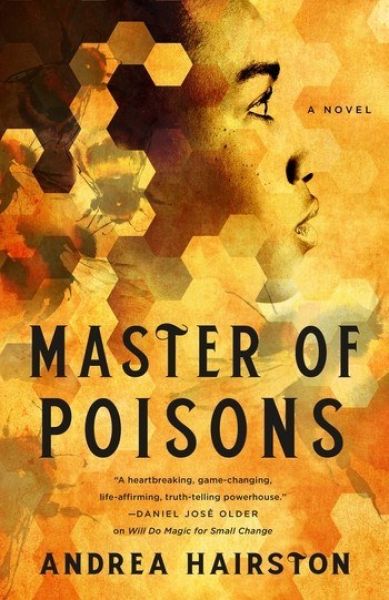With Some Smoke in Its Eye
Master of Poisons
By Andrea Hairston

16 Sep, 2022
Andrea Hairston’s 2021 Master of Poisons is a stand-alone, secondary world fantasy.
The Arkhysian empire has a simple plan for success:
- Relentlessly expand.
- Drain societies’ discards — criminals, heretics, and the unlucky (like magical adept Awa) — of blood to use in magic.
- Do its best to ignore the long-term environmental and economic costs of its policies.
Reality has no respect for society’s elite, thus the magic-induced environmental crisis now facing the empire.
Poison deserts have spread across the empire. While blood magic can protect some of the cities, cities are dependent on increasingly scarce farmland for food. If things continue as they are, the empire is doomed.
Imperial advisor Djola is a pragmatic man, always seeking to find the best or at least least-bad solution to any crisis. So far he has supported the empire despite its flaws, guiding it to the best of his ability away from its most monstrous abuses. If imperial economic practices bring ecological doom, then for Djola, the solution is clear: find some other way to do things, even if the adjustment period is painful.
Awa occupies a far humbler niche: sold by her father to finance her brothers’ education, she was lucky enough to fall into the hands of the Green Elders, adepts who hoped to educate her and recruit her to their guild. Nothing unsavory.
Unfortunately for Awa, the empire does not value the Green Elders. In the council’s eyes, Green Elders and their students are at best blood fuel for magic. Her education makes her a criminal and soon enough, a prisoner.
Djola’s rivals on the council stand to be mildly inconvenienced by reform. Therefore, they orchestrate a far superior course of action. Convince the Emperor to dispatch Djola on a lengthy, quite possibly fruitless quest for powerful magic lost centuries ago, while they solidify their political power. Many may die because of this, but not people who matter.
There are just one or two small problems with this plan. First, Djola might actually find what he was looking for. Second, Djola’s view of the empire might evolve following the news that his rivals used his absence to murder Djola’s family. Third, Awa might not merely survive her abuse, might not merely escape, but could well ally with Djola against their common enemies. But what are the odds of that?
~oOo~
The novel splits its perspective between Djola and Awa. Since Djola is very highly placed, whereas Awa was rated by her unpleasant father just below livestock, readers can see how the empire looks from the top and how it looks from the very bottom. Neither view will convince readers that the empire is a place in which anyone sensible would want to live; even the rulers live precarious lives wherein a momentary lapse in vigilance spells death. I suppose what makes the society work to the extent it works is that the poor have no choice and the powerful are certain they won’t stumble. It worked in Tudor England!
One almost gets the sense that there are subtle subtexts here, that the author might well want the reader to draw an analogy between the way the empire’s short-sighted policies immiserate the masses while dooming the empire in the long run. However, simple logic proves that in the real world, profit and virtue are the same thing. Since long-term consequences would undermine that model, it follows that there cannot possibly be long-term consequences[i].
There is, however, one positive aspect to it all, which is that the crisis appears to be regional or at most continental. Worlds are big places. Try hard not to be in or near the empire.
Content warning: there is slavery and piracy in this novel. The author presents an unromantic view of both. Readers whose view of pirates is mainly based on Gilbert and Sullivan and whose grasp of slavery was shaped by Gone with the Wind might well be astounded to discover that pirates are rape-happy, homicidal bandits and that slavers are even worse.
While a grim read, Master of Poisons does not present a hopeless narrative. I won’t say it’s necessarily a happy ending but at least it is a satisfactory one.
Master of Poisons is available here (Amazon US), here (Amazon Canada), here (Amazon UK), here (Barnes & Noble), here (Book Depository), and here (Chapters-Indigo).
[i] Despite which I don’t plan to move anywhere near the current sea level.
